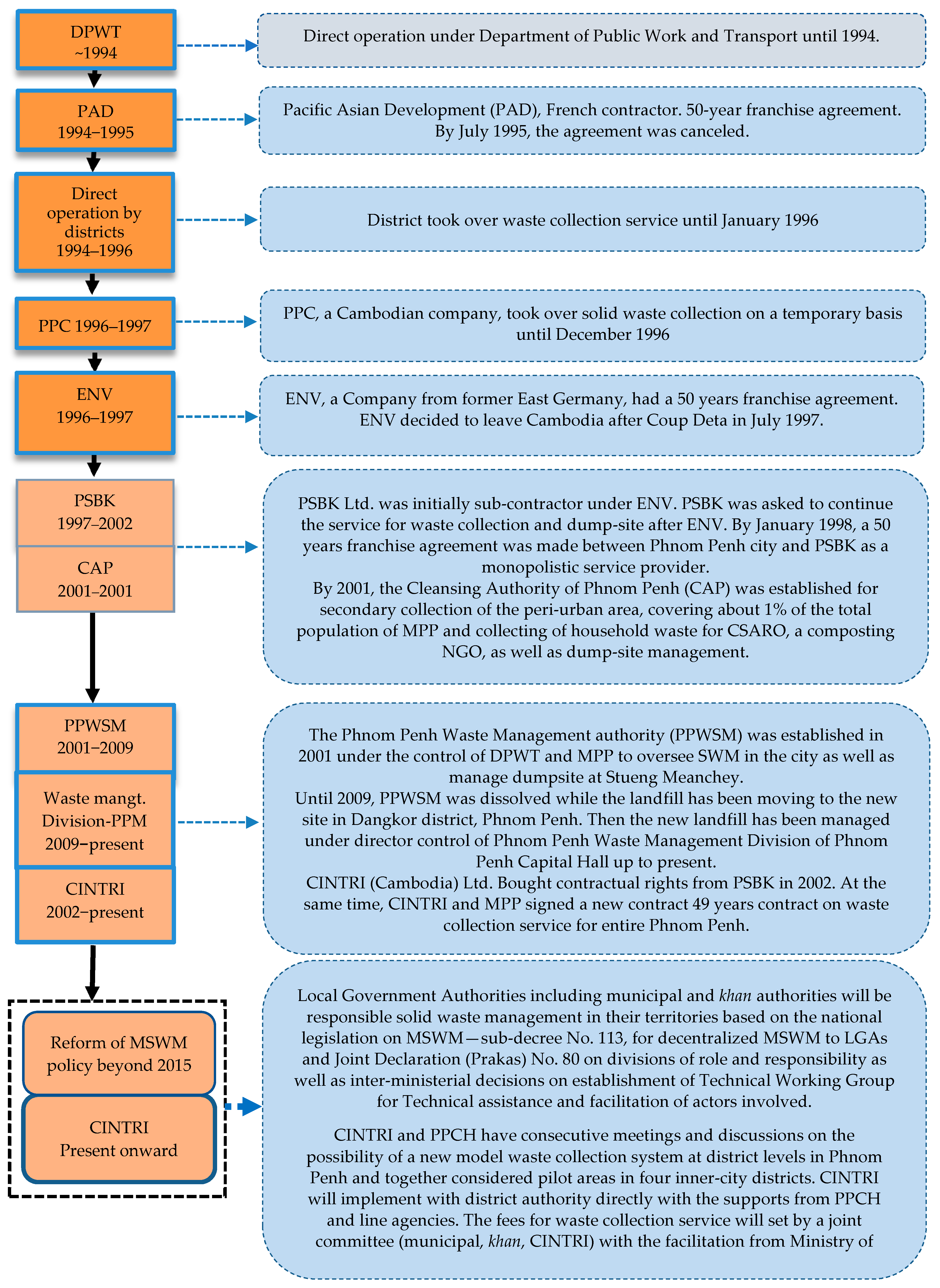Assessment of Public–Private Partnership in Municipal Solid Waste Management in Phnom Penh, Cambodia
Abstract
1. Introduction
2. Public and Private Sector Actors in Municipal Solid Waste Management (MSWM)
3. Solid Waste Management and the Public Sector
3.1. National Level
3.2. Local Government Units
3.3. Private Operator on Solid Waste Service
4. The Study Area: Phnom Penh Capital
5. Methods and Materials
Performance Indicators for Assessing Sustainable Waste Management
6. Results and Discussion Waste Generation and Composition
6.1. Waste Collection, Transportation and Disposal
6.2. Public and Private Sector Role
6.3. Monitoring and Regulations
CINTRI’s political protected…control of guarantee revenues irrespective of performance is the root cause of the poor performance of solid waste collection in Phnom Penh.
6.4. Institutional Management and Operational Framework
6.5. Stakeholder Involvement
6.6. Quality of Services
6.7. Personnel Resources and Labor Conditions
6.8. Public Perception
6.9. System Viability in SWM
7. Priority Actions and Recommendations for Improving Public–Private Partnership on SWM
- Enhancing PPP and social acceptability. To reduce the deficiency of the waste collection system in Phnom Penh, the key measure for successful development of stakeholder participation is considering public interest, economic interest, preventing political manipulation and the will of municipal, Khan and Sangkat councils. The operational framework and procedure in PPP should be adjusted toward the system goals.
- Resource management of the public sector. LGA needs to be self-sustaining in its waste management program and strategy to reduce reliance on the private sector and also national government funding (subsidies).
- Continue monitoring and enforcing solid waste disposal regulations: implementing proper monitoring, controlling procedures and enforcing urban solid waste management regulations (e.g., sub-decree No. 113 on MSWM). These measures are necessary to reduce illegal dumping and should be enshrined in new urban waste management policies.
- Economic burden to LGAs and CINTRI. To reduce the fiscal and financial burden, operational processes for cost-recovery can be made through implementing an applicable fee that will adequately fund the LGAs and provide viable financing to CINTRI for a modern, sustainable system.
- Consideration of waste collection options. The requirements of management services, quality assessment, and priorities for cooperation between the contractor and the LGAs should be studied so that the options for the collection system are based on sound data.
- Building on strengths and working politically and flexible. Each Khan and municipal authorities should establish an effective mechanism to resolve constraints and obstacles by having regular technical working group meetings and discussions. The technical working groups established by joint ministries could provide the platform for involved parties to identify common ground and make discussion. In addition, the study suggests that LGAs should be working politically and flexibly based on their own approaches and strengths for re-allocation of resources and funds from national governments and multinational corporations.
- Capacity Building: Professionals and paraprofessionals in local government units are often not trained in many aspects of waste management, such as the future planning based on sound resource management performance. Proper training of LGAs’ personnel dealing with waste management and service management is needed and critical in this transition, as also suggested by Seng et al. [37]; Spoann [15] and NLLC [17] in their case studies of Cambodia.
8. Conclusions
Author Contributions
Funding
Acknowledgments
Conflicts of Interest
References
- Massoud, M.A.; El-Fadel, M.; Malak, A.A. Assessment of public vs private MSW management: A case study. J. Environ. Manag. 2003, 69, 15–24. [Google Scholar] [CrossRef]
- Lasisi, K.S. An Appraisal of Municipal Solid Waste Management in Lagos State; Longman Publications: Ibadan, Nigeria, 2007. [Google Scholar]
- Massoud, M.A.; El-Fadel, M. Public–private partnerships for solid waste management services. Environ. Manag. 2002, 30, 0621–0630. [Google Scholar] [CrossRef] [PubMed]
- Aliu, I.R.; Adeyemi, O.E.; Adebayo, A. Municipal household solid waste collection strategies in an African megacity: Analysis of public private partnership performance in Lagos. Waste Manag. Res. 2014, 32, 67–78. [Google Scholar] [CrossRef] [PubMed]
- Stoker, G. Conclusion: Privatization, urban government and the citizen. In The Privatization of Urban Services in Europe; Lorrain, D., Stoker, G., Eds.; Pinter: London, UK, 1997; pp. 204–212. [Google Scholar]
- Spoann, V.; Nitivathananon, V.; Amin, A.T.M.N. An Assessment of Contracted Waste Service Collection Services: Case Study of Waste Collection in Siem Reap, Cambodia. In Proceedings of the International Conference on Integrated Solid Waste Management in Southeast Asia, Siem Reap, Cambodia, 5–7 July 2005; Coowanitwong, N., Shapkota, P., Pradhan, P., Nitivattananon, V., Eds.; Asian Institute of Technology: Bangkok, Thailand, 2006; pp. 245–260. [Google Scholar]
- Ahmed, S.A.; Mansoor, A. Partnerships for solid waste management in developing countries: Linking theories to realities. Habitat Int. 2004, 28, 467–479. [Google Scholar] [CrossRef]
- Post, J. The problems and potentials of privatising solid waste management in Kumasi, Ghana. Habitat Int. 1999, 23, 201–215. [Google Scholar] [CrossRef]
- Denney, L. Working Politically in Practice Series—Case Study No. 8—Reforming Solid Waste Management in Phnom Penh; The Asia Foundation and the Overseas Development Institute: San Francisco, CA, USA, 2016. [Google Scholar]
- Zurbrügg, C.; Caniato, M.; Vaccari, M. How assessment methods can support solid waste management in developing countries—A critical review. Sustainability 2014, 27, 545–570. [Google Scholar] [CrossRef]
- Leitmann, J. Sustaining Cities: Environmental Planning and Management in Urban Design; McGraw-Hill: New York, NY, USA, 1999. [Google Scholar]
- Memon, M.A.; Imura, H.; Shirakwa, H. Reforms for managing urban environmental infrastructure and services in Asia. J. Environ. Dev. 2006, 15, 857–868. [Google Scholar] [CrossRef]
- Bartone, C.R.; Leite, L.; Triche, T.; Schertenleib, R. Private Sector Participation in Municipal Solid Waste Service: Experience in Latin America. Waste Manag. Res. 1991, 9, 495–509. [Google Scholar] [CrossRef]
- Spoann, V. Assessment of Contracted Waste Collection Services: Case Study in Siem Reap Municipality, Cambodia; VDM Verlag Dr Müller: Saarbrücken, Germany, 2010. [Google Scholar]
- Spoann, V.; Takeshi, F.; Bandith, S.; Chanthy, L. Municipal solid waste management: Constraints and opportunities to improve capacity of local government authorities of Phnom Penh Capital. Waste Manag. Res. 2018, 36, 985–992. [Google Scholar] [CrossRef] [PubMed]
- RGC (Royal Government of Cambodia). Sub-Decree on Solid Waste Management; Royal Government of Cambodia: Phnom Penh, Cambodia, 2015.
- NLLC (National League of Local Councils). Survey Report on Waste Management Practices at Municipality/District Level; NLLC: Phnom Penh, Cambodia, 2016. [Google Scholar]
- Vong, M. Progress and Challenges of Deconcentralization in Cambodia in Cambodia: The Case of Urban Solid Waste Management; CDRI: Phnom Penh, Cambodia, 2016. [Google Scholar]
- COMPED. Study and Analysis on Institutional and Legal Framework of Solid Waste Management and the Development of the Current Landfill Operation and Management in Phnom Penh; Final Report for the Asian Foundation; COMPED: Phnom Penh, Cambodia, 2014. [Google Scholar]
- Kum, V.; Sharp, A.; Harnpornchai, N. Improving the solid waste management in Phnom Penh city: A strategic approach. Waste Manag. 2005, 25, 101–109. [Google Scholar] [CrossRef] [PubMed]
- RGC (Royal Government of Cambodia). National Strategic Development Plan 2014-2018; Royal Government of Cambodia: Phnom Penh, Cambodia, 2014.
- JICA (Japanese International Cooperation Ageny). Drainage Improvement and Flood Protection in Phnom Penh–Achievements, Constraints and Plans; Final report; JICA: Phnom Penh, Cambodia, 2014.
- Hul, S.; Kouk, F.; Soy, T.; Khoeurn, K. Solid Waste Generation and Life-Span with Credible Growth Forecasts Waste Generation, Volume and Composition; Final Report for the Asian Foundation; The Asian Foundation: Phnom Penh, Cambodia, 2015. [Google Scholar]
- PPCH (Phnom Penh City Hall). Challenges and Opportunities for Phnom Penh Green City Development Plan, Presentation for the workshop on Cambodia Green City Development Plan, September 2015; PPCH: Phnom Penh, Cambodia, 2015. [Google Scholar]
- GGGI (Global Green Growth Institute). Phnom Penh Green City Strategic Plan 2016-2025; ICEM consultants prepared for GGGI; GGGI: Phnom Penh, Cambodia, 2016. [Google Scholar]
- Joseph, K. Stakeholder participation for sustainable waste management. Habitat Int. 2006, 30, 863–871. [Google Scholar] [CrossRef]
- Visvanathan, C.; Trankler, J.; Zou, G.; Kurian, J.; Basnayake, B.F.; Chart, C. Municipal Solid Waste Management in Asia; Asian Regional Research Programme on Environmental Technology; Asian Institute of Technology: Bangkok, Thailand, 2004. [Google Scholar]
- Van de Klundert, A.; Anschütz, J.; Scheinberg, A. Integrated Sustainable Waste Management: The Concept. Tools for Decision-Makers. Experiences from the Urban Waste Expertise Programme (1995–2001); WASTE: Gouda, The Netherlands, 2001. [Google Scholar]
- Wilson, D.C.; Tormin, A.C. Planning Guide for Strategic Municipal Solid Waste Management in Major Cities in Low-income Countries; London, Environmental Resource Management for the World Bank/SDC: London, UK, 2000. [Google Scholar]
- Seng, B.; Hirayama, K.; Katayam-Hirayama, K.; Ochiai, S.; Kaneko, H. Scenario analysis of the benefit of municipal organic-waste composting over landfill, Cambodia. J. Environ. Manag. 2013, 114, 216–224. [Google Scholar] [CrossRef] [PubMed]
- PPDoE. Presentation on Phnom Penh Municipality of Phnom Penh for Phnom Penh Green City Strategic Plan; Department of Environment: Phnom Penh, Cambodia, 2016.
- Seng, B.; Kaneko, H.; Hirayama, K.; Katayama-Hirayama, K. Municipal solid waste management in Phnom Penh, Capital city of Cambodia. Waste Manag. Res. 2010, 29, 491–500. [Google Scholar] [CrossRef] [PubMed]
- Hoornweg, D.; Thomas, L. What a Waste: Solid Waste Management in Asia; Urban Development Sector Unit, East Asia and Pacific Region, World Bank: Washington, DC, USA, 1999. [Google Scholar]
- JICA. The Study on Solid Waste Management in the Municipality of Phnom Penh; Final Report; JICA: Phnom Penh, Cambodia, 2005.
- MOE. Inventory Data on Waste Generation for Cambodia, Report for Department of Solid Waste Management; MOE: Phnom Penh, Cambodia, 2014.
- Obirih-Opareh, N.; Post, J. Quality assessment of public and private modes of solid waste collection in Accra, Ghana. Habitat Int. 2002, 26, 95–112. [Google Scholar] [CrossRef]
- Seng, B.; Fujiwara, T.; Spoann, V. Households’ knowledge, attitudes, and practices toward solid waste management in suburbs of Phnom Penh, Cambodia. Waste Manag. Res. 2018, 36, 993–1000. [Google Scholar] [CrossRef] [PubMed]
- Amin, A.T.M.N. Economic and Financial Considerations in Urban Environmental Management; UMP-Asia Occasional Paper 65; Urban Management Programme: Bangkok, Thailand, 2005. [Google Scholar]


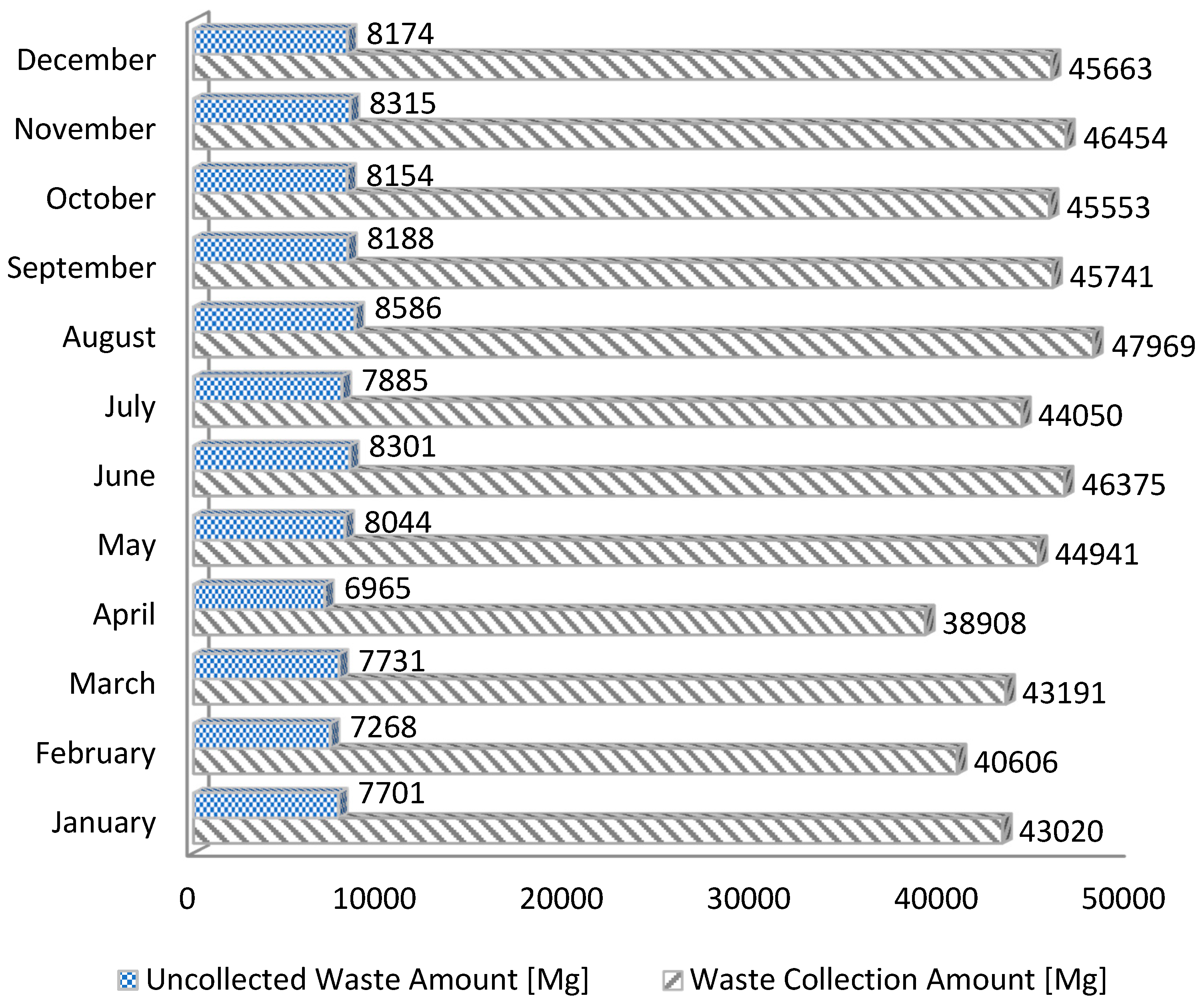
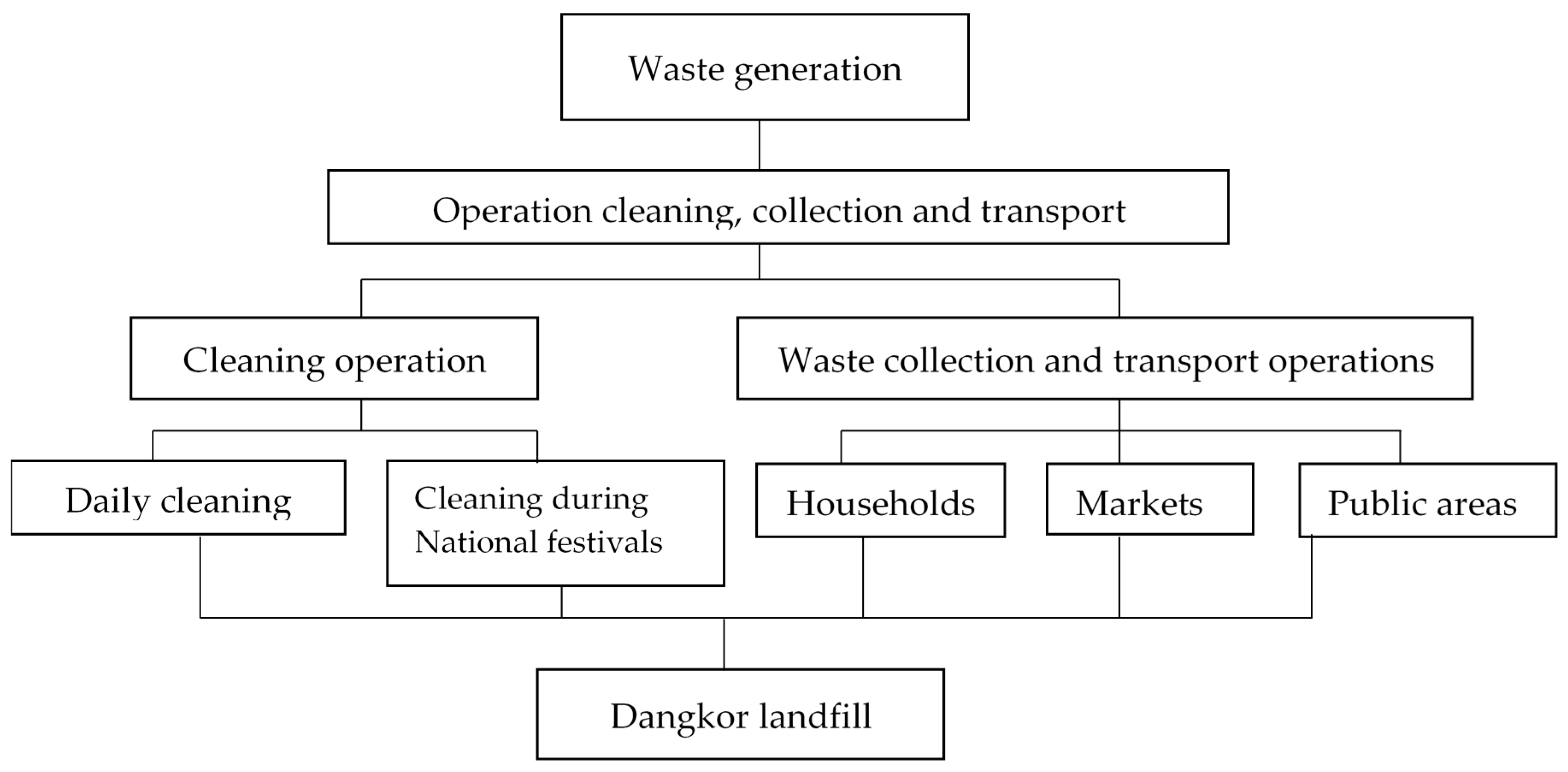
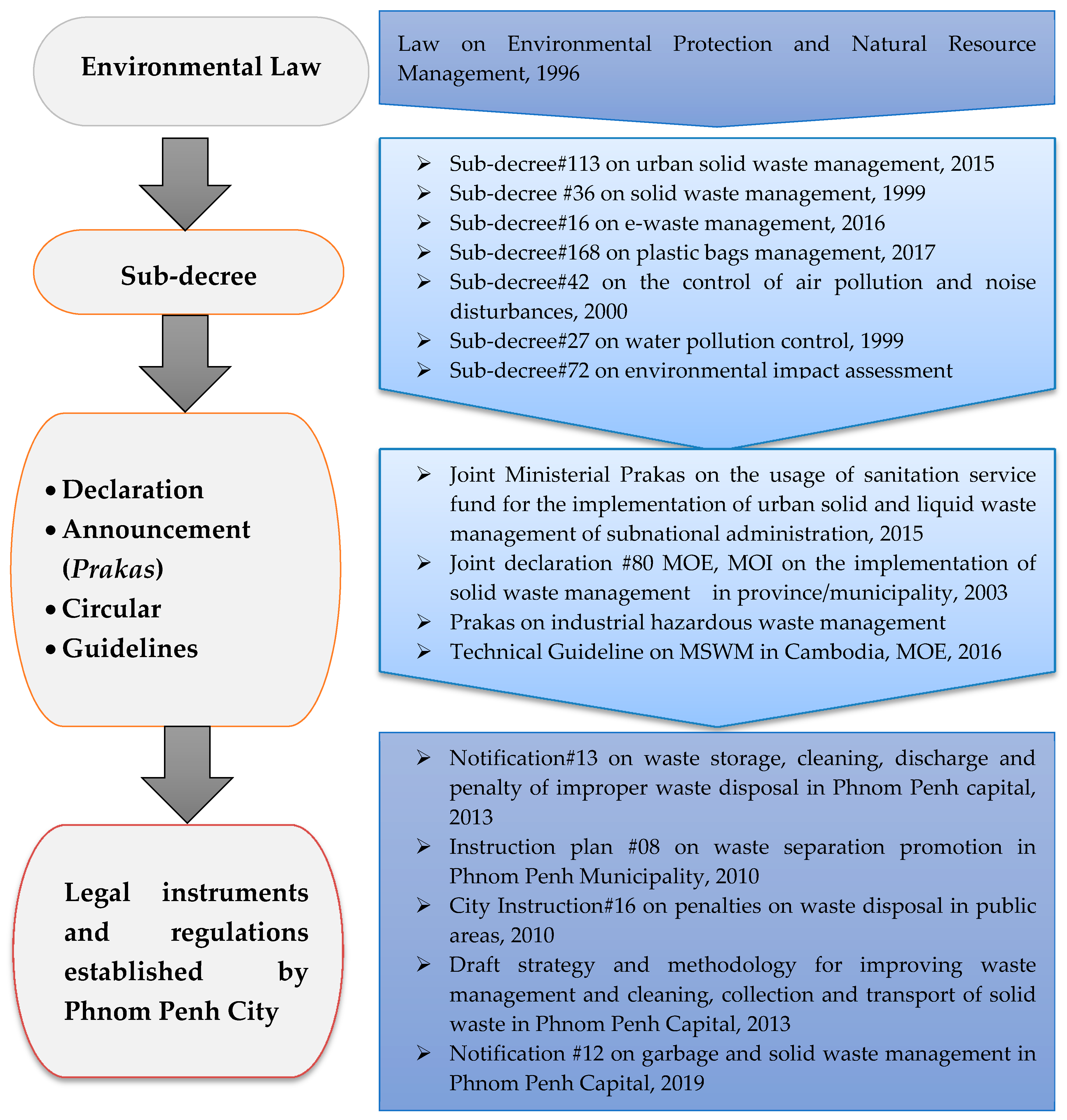
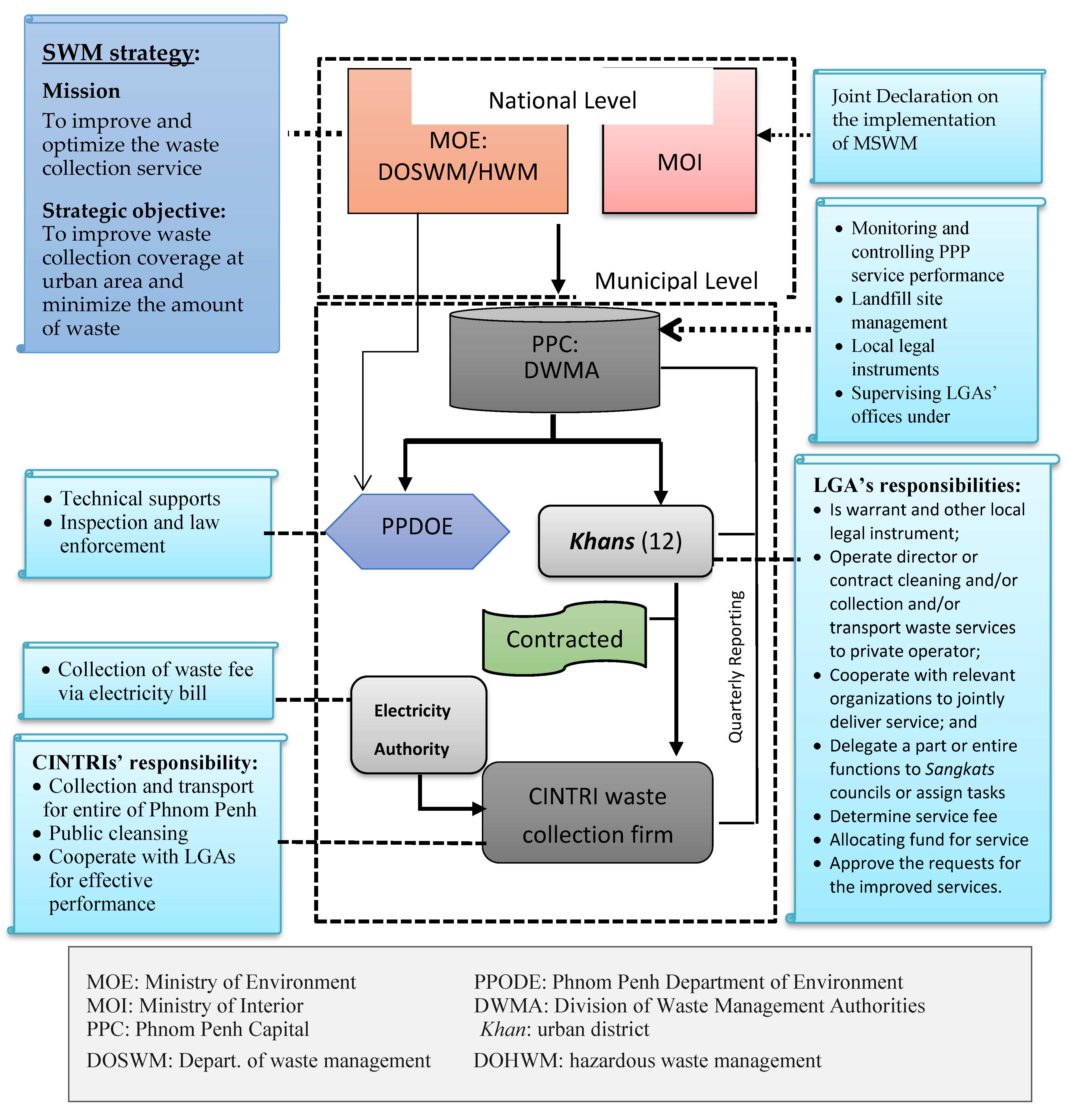
| Sustainability Domain and Indicator | Questions to be Covered |
|---|---|
| 1. Technical Aspects | |
|
|
| 2. Health and Environmental Aspects | |
|
|
| 3. Institutional and Organizational Aspects | |
|
|
| 4. Financial Viability and Economic Aspects | |
|
|
| 5. Social Aspects | |
|
|
| 6. Policy and Legislative Aspects | |
|
|
| Year | Population in Million | GDP (USD·Capita−1) | Waste Amount in Phnom Penh (tons·year−1) | |
|---|---|---|---|---|
| Cambodia | Phnom Penh | |||
| 2004 | 12.824 | 1.044 | 389 | 227,910 |
| 2005 | 12.963 | 1.108 | 454 | 266,781 |
| 2006 | 13.103 | 1.177 | 513 | 324,159 |
| 2007 | 13.245 | 1.249 | 575 | 343,657 |
| 2008 | 13.868 | 1.326 | 739 | 361,344 |
| 2009 | 14.085 | 1.438 | 765 | 393,141 |
| 2010 | 14.302 | 1.504 | 830 | 409,335 |
| 2011 | 14.521 | 1.570 | 853 | 442,469 |
| 2012 | 14.741 | 1.637 | 915 | 492,380 |
| 2013 | 14.962 | 1.704 | 1036 | 531,340 |
| 2014 | 15.184 | 1.770 | 1137 | 617,489 |
| 2015 | 15.405 | 1.835 | 1237 | 617,905 |
© 2019 by the authors. Licensee MDPI, Basel, Switzerland. This article is an open access article distributed under the terms and conditions of the Creative Commons Attribution (CC BY) license (http://creativecommons.org/licenses/by/4.0/).
Share and Cite
Spoann, V.; Fujiwara, T.; Seng, B.; Lay, C.; Yim, M. Assessment of Public–Private Partnership in Municipal Solid Waste Management in Phnom Penh, Cambodia. Sustainability 2019, 11, 1228. https://doi.org/10.3390/su11051228
Spoann V, Fujiwara T, Seng B, Lay C, Yim M. Assessment of Public–Private Partnership in Municipal Solid Waste Management in Phnom Penh, Cambodia. Sustainability. 2019; 11(5):1228. https://doi.org/10.3390/su11051228
Chicago/Turabian StyleSpoann, Vin, Takeshi Fujiwara, Bandith Seng, Chanthy Lay, and Mongtoeun Yim. 2019. "Assessment of Public–Private Partnership in Municipal Solid Waste Management in Phnom Penh, Cambodia" Sustainability 11, no. 5: 1228. https://doi.org/10.3390/su11051228
APA StyleSpoann, V., Fujiwara, T., Seng, B., Lay, C., & Yim, M. (2019). Assessment of Public–Private Partnership in Municipal Solid Waste Management in Phnom Penh, Cambodia. Sustainability, 11(5), 1228. https://doi.org/10.3390/su11051228




